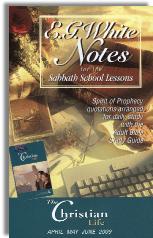|
||||||||||||||
Commentary on "Hope"
Day 1: Sabbath Afternoon, April 11, 2009
This week’s lesson looks at modern progress which was founded on reason, and expressed in technology and moral improvement. Even though western society has been optimistic about the future, there is abundant evidence that human progress is an utter failure. The author lists wars, terrorism, and environmental degradation as evidences of this failure, and concludes that mankind has no basis for optimism in anything he can accomplish. The author rejects optimism in man’s capabilities, and exchanges it for hope in what God has promised us through Jesus.
Problems
We can wholeheartedly agree that human progress has been a failure; our only hope is in God. However, what is lacking at the beginning of this week’s discussion is a definition of hope. We need to know what hope is before we can take comfort in it. The common understanding of hope includes the desire for some future event with a belief in its possible occurrence. Our desire may be irrational. We may have the smallest expectation of the desire being met, but we cling to the belief anyway. Perhaps that is why politicians are so fond of invoking it. The common understanding of the word “hope” includes the element of uncertainty. This could be expressed as,
Desire + uncertain fulfillment = hope.
The lesson states that our hope is based only on Jesus and his promises to us. How certain can the Christ follower be that these promises will be fulfilled for him as an individual? Does God want us to have certainty in our future with him, or is having assurance of salvation wishful thinking and presumption? The biblical hope doesn’t just indulge the cautious confidence of Christians, but those who belong to Christ are commanded to seize hold with “full assurance of hope.” That is how we will endure. Heb. 6:11
“Now faith is the assurance of things hoped for, the conviction of things not seen.” Heb. 11:1 Hope is faith’s confident possession of the future, and this brings assurance. Anything less than full assurance shows a “sluggish” lack of faith in God’s word. We might say that biblical hope can be expressed as:
Desire + God’s Word = Full Assurance
As we study the Guide this week, we will learn how we can avoid sluggish uncertainty, and seize hold of God’s word with real hope and joy.
Summary
- The lesson does not define its object of study.
- The common usage of the word “hope” contains the element of uncertainty about the outcome of one’s desires. However, the Bible commands us to hope in a future based on his word, which allows no uncertainty.
- Saving faith gives confident hope in God’s promises and he who is faithful will give endurance to the end.
Copyright 2008 BibleStudiesForAdventists.com. All rights reserved. Revised April 11, 2009. This website is published by Life Assurance Ministries, Glendale, Arizona, USA, the publisher of Proclamation! Magazine. Contact email: BibleStudiesForAdventists@gmail.com.
The Sabbath School Bible Study Guide and the corresponding E.G. White Notes are published by Pacific Press Publishing Association, which is owned and operated by the Seventh-day Adventist church. The current quarter's editions are pictured above.
Official Adventist Resources
Standard Edition Study Guide Week 3
Teacher's Edition Study Guide Week 3
Easy Reading Edition Study Guide Week 3
Search the Complete Published Ellen G. White Writings


